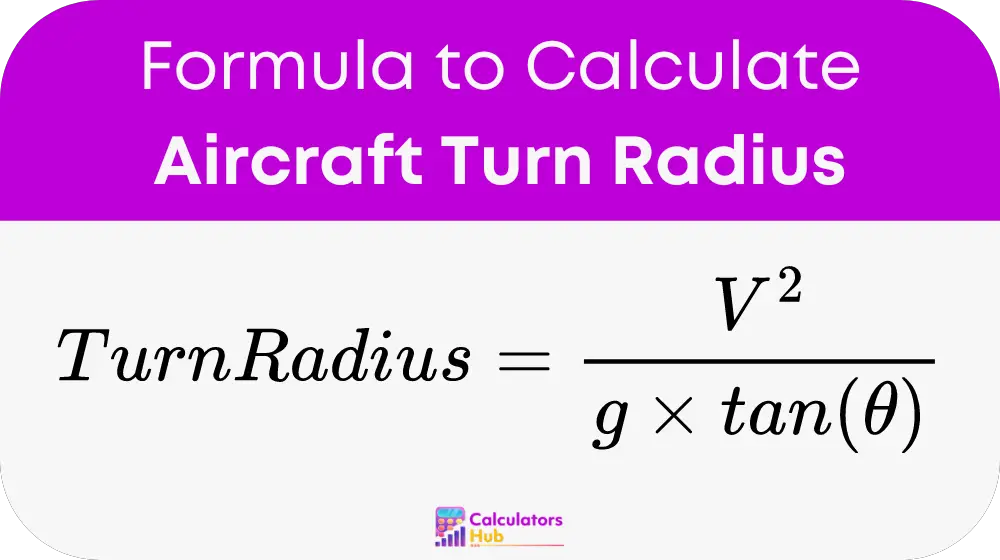The Aircraft Turn Radius Calculator is an indispensable tool used by pilots and flight planners to calculate the necessary radius for an aircraft to turn at a specific airspeed and bank angle. This tool not only enhances the safety of flights by ensuring the aircraft remains within its operational limits but also assists in route planning and maneuvering in restricted airspaces. Understanding and applying the correct turn radius is crucial for avoiding unnecessary stress on the aircraft structure and ensuring smooth and efficient navigation.
Formula of Aircraft Turn Radius Calculator
To determine the turn radius of an aircraft, the following formula is used:

This formula includes:
- Turn Radius: The radius of the circle that the aircraft will describe while turning, measured in meters or feet.
- V: The true airspeed of the aircraft, provided in meters per second or feet per second.
- g: The acceleration due to gravity, constant at approximately 9.81 meters per second squared or 32.174 feet per second squared.
- tan(θ): The tangent of the bank angle, θ, which is the angle at which the aircraft tilts to achieve the turn, measured in degrees or radians.
This calculation is pivotal in ensuring that turns are executed safely, particularly when maneuvering near the ground or in tightly controlled airspaces.
Table for General Terms
Below is a table of key terms associated with aircraft turn radius calculations, designed to aid understanding and ease of use of the Aircraft Turn Radius Calculator:
| Term | Definition |
|---|---|
| Turn Radius | The radius of the path the aircraft follows during a turn. |
| True Airspeed (V) | The speed of the aircraft relative to the air. |
| Gravity (g) | The force of gravity, a constant in flight calculations. |
| Bank Angle (θ) | The angle at which the aircraft tilts to initiate a turn. |
Example of Aircraft Turn Radius Calculator
For a practical example, consider an aircraft flying at a true airspeed of 150 meters per second that needs to execute a turn with a bank angle of 25 degrees. Using the formula:
- V = 150 m/s,
- g = 9.81 m/s²,
- θ = 25 degrees.
The turn radius would be calculate as follows:
Turn Radius = (150^2) / (9.81 * tan(25))
Most Common FAQs
The primary factors are the airspeed and the bank angle. Higher airspeeds or shallower bank angles result in a larger turn radius.
Accurate calculation of the turn radius is crucial for ensuring the aircraft stays within safe operational limits and navigates effectively around obstacles and through restricted spaces.
Yes, the calculator is versatile and can be adapt for different types of aircraft, providing essential calculations for both small private planes and large commercial jets.